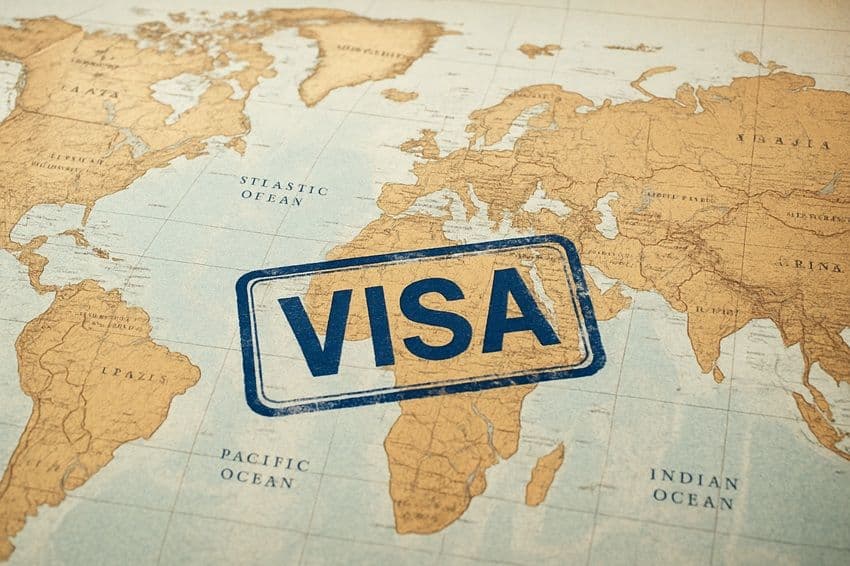Ask GRAI Anything
Your Real Estate Questions, Answered Instantly via Chat


Help us make GRAI even better by sharing your feature requests.

In 2015, governments were debating how to restrict migration.
In 2025, they’re competing to attract it - laptop by laptop.
The global race for digital nomads has reshaped immigration, taxation, and now real estate itself. What began as a fringe movement of freelancers is now an economic force influencing property markets from Chiang Mai to Lisbon.
There are now over 40 million digital nomads globally - up more than 70% since 2020. They contribute an estimated $450 billion annually to the global economy, with average monthly spending near $3,000 per worker.
The pitch from governments is simple:
“Don’t immigrate permanently. Just bring your income and spend it here.” This model turns human mobility into an exportable asset. Instead of factories or commodities, countries are now competing for remote income streams.
Today there are more than 70 countries with Digital Nomad Programs
The motivations are clear:
Tourism diversification: Replace seasonal visitors with longer-stay, high-spending residents.
Fiscal capture: Tax partial income or consumption without adding welfare burdens.
Urban revitalization: Fill vacant rentals, coworking spaces, and new developments.
Brain import: Attract entrepreneurs, technologists, and creators without formal immigration.
But this wave comes with a side effect - housing inflation. The same people countries are competing for are unintentionally pricing out locals.
Also Read: US Golden Visa 2025: Cost, Eligibility & Green Card Perks
Thailand: The OG of Nomad Living Goes Premium
The Long-Term Resident Visa (LTR) offers up to 10 years of stay for professionals earning over $80,000/year, with tax breaks and family inclusion. Rents in Chiang Mai and Bangkok have surged 3-10% since 2022, with condos increasingly marketed in USD.

Portugal: From Golden Visa to Digital Nomad Magnet
Portugal’s D7 and Nomad Visa drew thousands of tech freelancers and remote workers. But rents in Lisbon rose 30-35% from 2020–2025, prompting the government to phase out its Golden Visa real estate route in 2024.

Indonesia: Paradise Turns Professional
The Second Home Visa allows foreigners earning over $130,000 to stay for up to 5 years. Bali’s villa rents jumped 40% in two years, driven by digital workers and creators relocating post-COVID.

Georgia: Europe’s Easiest Entry Point
With 1-year visa-free access for 95+ nationalities and a 10% flat income tax, Tbilisi’s nomad population has grown 60% since 2022. Foreign ownership is unrestricted - making it a favorite for early-stage investors.

UAE: Institutional Nomadism
Dubai’s Remote Work Visa is creating a hybrid workforce of tech nomads and high-net-worth expats. Rents rose 14% YoY in 2025, with mid-market apartments seeing the fastest absorption.

Digital nomads have become a new class of floating tenants - mobile, high-spending, and globally unbound.
This creates both growth and volatility:
Rents rise faster in nomad hubs than in domestic job centers.
Short-term housing transitions into long-stay furnished stock.
Local wages fail to keep pace with global digital incomes.
In Chiang Mai, Lisbon, and Mexico City, locals are already protesting “Airbnbification 2.0” - not short-term tourists, but long-stay foreigners occupying middle-market housing.
For investors, these “Visa Wars” represent a once-in-a-generation opportunity - the monetization of mobile demand.
The smartest capital is looking beyond traditional ownership models and focusing on:
Build-to-Rent (BTR) units targeting long-stay nomads.
Revenue-managed furnished rentals with dynamic pricing.
Portfolio diversification across open-visa markets like Thailand, Georgia, and Mexico.
AI-driven forecasting to identify markets before rental spikes occur.
The key insight: Visa policy is now a leading indicator of real estate appreciation.
With GRAI, you can simulate, compare, and forecast housing outcomes in emerging mobility hubs:
“Rank 50 cities by visa openness + rent yield + cost of living.”
“Forecast 5-year rental ROI in Bali under Second Home Visa inflows.”
“Compare Lisbon vs Tbilisi affordability under remote-worker wage growth.”
“Simulate investor portfolio diversification across 10 nomad visa markets.”
Start your free trial here: https://internationalreal.estate/chat
Visa programs will get smarter, not slower. Expect:
Tax harmonization between remote-worker programs.
Tiered visas rewarding property purchases or long-term leases.
Regional competition (ASEAN, GCC, EU) for nomad clusters.
Related: How Immigration Is Reshaping Global Real Estate Markets
The next economic frontier isn’t just digital - it’s geographic. Every country is trying to attract the same thing: income without immigration.
And in that race, the biggest winners won’t be the nomads or the landlords - but the data models that saw it coming.